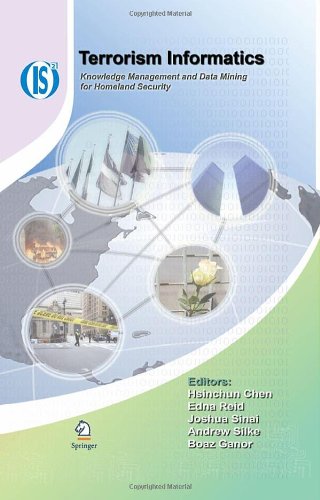Product desciption
Terrorism Informatics Knowledge Management And Data Mining For Homeland Security 1st Edition Hsinchun Chen by Hsinchun Chen, Edna Reid, Joshua Sinai, Andrew Silke, Boaz Ganor 9780387716121, 0387716122 instant download after payment.
Terrorism informatics has been defined as the application of advanced methodologies, information fusion and analysis techniques to acquire, integrate process, analyze, and manage the diversity of terrorism-related information for international and homeland security-related applications. The wide variety of methods used in terrorism informatics are derived from Computer Science, Informatics, Statistics, Mathematics, Linguistics, Social Sciences, and Public Policy and these methods are involved in the collection of huge amounts of information from varied and multiple sources and of many types in numerous languages. Information fusion and information technology analysis techniques which include data mining, data integration, language translation technologies, and image and video processing play central roles in the prevention, detection, and remediation of terrorism. While there has been substantial investment on computer technology research applications to terrorism, much of the results and the literature has been a fragmented hodgepodge that is too narrowly focused on unconnected and unlinked discipline domains. As a result, there has been little effort to relate the research across the discipline domains from which terrorism informatics is drawn. TERROR INFORMATICS: Knowledge Management and Data Mining for Homeland Security will provide an interdisciplinary and comprehensive survey of the state-of-the-art of terrorism informatics domain along three basic dimensions: methodological issues in terrorism research; information infusion techniques to support terrorism prevention, detection, and response; and legal, social, privacy, and data confidentiality challenges and approaches. The book will bring "knowledge" that can be used by scientists, security professionals, counterterrorism experts, and policy makers. The book will be organized into three major subject areas: Part I will focus on the methodological issues in terrorism research. The methodological issues that impact trends, achievements, root causes, and failures in terrorism research will be treated within the context of the methods of retrieving and developing, sharing, and implementing terrorism informatics methodologies and resources. Part II will focus on three major areas of terrorism research: prevention, detection, and established governmental responses to terrorism. This section will systematically examine the current and ongoing research including recent case studies and application of terrorism informatics techniques. Examples of such techniques are web mining, social network analysis, and multimodal event extraction, analysis to the terrorism phenomenon, etc. Part III will present the critical and relevant social/technical areas to terrorism research including social, privacy, data confidentiality, and legal challenges.


